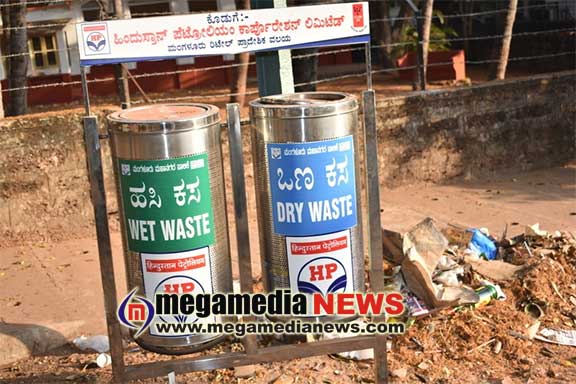Civic body to collect wet waste on all days of the week from July 1
12:56 PM, Thursday, June 27th, 2019 Mangaluru : The Mangaluru City Corporation (MCC), in a fresh bid to streamline its solid waste handling in terms of waste segregation at source, has urged people to segregate their dry and wet waste, accordingly.
Mangaluru : The Mangaluru City Corporation (MCC), in a fresh bid to streamline its solid waste handling in terms of waste segregation at source, has urged people to segregate their dry and wet waste, accordingly.
Accordingly, from July 1, the contractor appointed by the civic body to collect waste – Antony Waste Handling Cell Pvt Ltd – will collect wet waste on all days of the week, barring Friday, on which day it will collect only dry waste from source.
B H Narayanappa, commissioner, Mangaluru City Corporation, said the civic body has taken steps to manage solid waste generated in the city as per Municipal Solid Waste Management rules, 2016.
According to the rules, households and commercial buildings and establishments, should segregate waste at its source, the commissioner said, adding that the solid waste management contractor will not accept mixed waste, at source, henceforth.
People throwing waste beside the road will be penalised as per provisions of the Karnataka Municipal Corporations Act, 1976, and Cleanliness and Solid Waste bylaws, 2018, of MCC. The bylaw empowers the civic body to impose fines ranging from Rs 100 to Rs 25,000 on anyone found violating provisions contained therein, and the competent authority will also follow up this transgression by filing a separate case, as per the statute books.
Madhu S Manohar, environment engineer, MCC, said the city generates around 350 tonnes of waste per day, and receives an additional 50 tonnes from adjoining urban local bodies at Ullal, Bantwal and Kotekar, taking the daily average to around 400 tonnes. “Out of the total waste received, nearly 60% is wet waste and the rest dry. The city has a compost plant with a capacity to handle 250 tonnes of organic and wet waste, and the rest goes to the landfill,” he said.
Mixed waste received at the city’s Pachchanady landfill is sorted, and organic matter and wet waste sent for composting, he said. The MCC has worked out alternative arrangements to collect dry and wet waste that commercial establishments generate each day – deploying primary collection vehicles for five trips – with three trips to collect wet waste and the rest for dry waste, and this is done daily, against the six and one day arrangement for households, he said.
Simillar Posts
Warning: count(): Parameter must be an array or an object that implements Countable in /home/megamcaq/public_html/wp-content/plugins/post-plugin-library/common_functions.php on line 357
- None Found
Leave a Reply
© Copyright 2008 www.megamedianews.com All Rights Reserved. Privacy Policy








 Posted in
Posted in  Tags:
Tags: 



